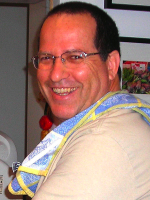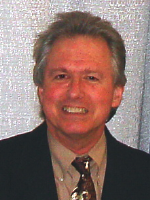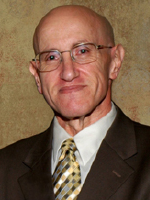Dani Ben-Zvi, University of Haifa, Israel
"Let Go: Focus on Learning Instead of Focus on Teaching"
Abstract
Change in statistics courses is often discussed in terms of better teaching. Instead, a focus on learning is considered in this session. Students' learning and understanding is suggested as a fundamental basis for research on developing statistical reasoning as well as better teaching. Listening carefully to students and observing closely their learning, emerging statistical reasoning, previous knowledge, perspectives and expectations can be facilitated by video recording of their statistical work. The emphasis of this session is not on video-based qualitative research methods, but on what one might learn from them. Some of the insights gained by listening to students during a decade of research in the International Collaboration for Research on Statistical Reasoning, Thinking, and Literacy (SRTL) will be shared. Collaboration with researchers from two other countries will be described to illustrate the importance of collaborative effort to analyze students' videos from different age levels, cultures, and contexts.
About the speaker
 Dani Ben-Zvi is a senior lecturer at the University of Haifa, Israel, in the Faculty of Education, Head of the Technologies in Education Graduate Department, and member of the Mathematics Education Graduate Department. His prime research interests draw upon two central aspects of human life: Statistical Thinking and Technology. He is a leading international scholar on statistical thinking and on students' learning with technological tools. The results of his studies in the area of statistical thinking are included in two books: The Challenge of Developing Statistical Literacy, Reasoning, and Thinking (Ben-Zvi & Garfield, 2004); and Developing Students' Statistical Reasoning: Connecting Research and Teaching Practice (Garfield & Ben-Zvi, 2008 ). These books describe what it means for students to understand and reason about statistical concepts, and suggests pedagogical methods for developing understanding and reasoning.
Dani Ben-Zvi is a senior lecturer at the University of Haifa, Israel, in the Faculty of Education, Head of the Technologies in Education Graduate Department, and member of the Mathematics Education Graduate Department. His prime research interests draw upon two central aspects of human life: Statistical Thinking and Technology. He is a leading international scholar on statistical thinking and on students' learning with technological tools. The results of his studies in the area of statistical thinking are included in two books: The Challenge of Developing Statistical Literacy, Reasoning, and Thinking (Ben-Zvi & Garfield, 2004); and Developing Students' Statistical Reasoning: Connecting Research and Teaching Practice (Garfield & Ben-Zvi, 2008 ). These books describe what it means for students to understand and reason about statistical concepts, and suggests pedagogical methods for developing understanding and reasoning.
George Cobb, Mount Holyoke College
"Close Your Eyes and Click Your Heels: There's No Place Like Bayes"
Abstract
In my 2005 USCOTS talk I argued that computers have made it possible to teach an introductory course that puts randomization rather than the normal distribution at its center. In the same spirit, in this talk I suggest that, looking to the future, we should think hard about teaching Bayesian logic as part of the introductory course. I'll begin with examples to illustrate how Bayesian thinking differs from what we currently teach, then give reasons why we ought to teach Bayesian thinking and why now, thanks to computers, we can teach Bayesian thinking in a first course, without relying on the theorem that bears his name. I'll conclude with some ways we may need to let go in order to grow.
About the speaker
 George Cobb is Robert L. Rooke Professor of Statistics at Mount Holyoke College. He is inaugural winner of the USCOTS Lifetime Achievement Award, an ASA Fellow ('93), former ASA vice president ('01-'04), ASA Founders Award recipient ('07), former member of the National Research Council's Committee on Applied and Theoretical Statistics, and founding chair of the ASA/MAA Committee on Undergraduate Statistics. Along the way he has (slowly) written or helped to write a handful of books, has (slowly) grown to enjoy collaborating with attorneys on legal cases, has (largely) overcome his terror of public speaking generally and of testifying in court in particular, and he has (reluctantly) come to recognize that, for him, despite his Quaker upbringing, the sight of an apple cart triggers happy fantasies of how to upset it.
George Cobb is Robert L. Rooke Professor of Statistics at Mount Holyoke College. He is inaugural winner of the USCOTS Lifetime Achievement Award, an ASA Fellow ('93), former ASA vice president ('01-'04), ASA Founders Award recipient ('07), former member of the National Research Council's Committee on Applied and Theoretical Statistics, and founding chair of the ASA/MAA Committee on Undergraduate Statistics. Along the way he has (slowly) written or helped to write a handful of books, has (slowly) grown to enjoy collaborating with attorneys on legal cases, has (largely) overcome his terror of public speaking generally and of testifying in court in particular, and he has (reluctantly) come to recognize that, for him, despite his Quaker upbringing, the sight of an apple cart triggers happy fantasies of how to upset it.
Peter Ewell, Center for Higher Education Management Systems
"What to Know After Letting Go: The Critical Role of Assessment"
Abstract
Changing a class or a curriculum is serious business. This is especially true if the changes made are of the fundamental nature contemplated by "letting go in order to grow." We make these changes, presumably, because we think we will get better learning. But do we? Assessment is critical to answering this question. But it is frequently an afterthought in classroom or curricular reform. I will argue in this session that it needs to be brought front and center. I will then describe some characteristics of good assessments to detect whether or not things are working, along with the all-important improvement activities that should follow from what they find.
About the speaker
 Peter Ewell is Vice President of the National Center for Higher Education Management Systems (NCHEMS). Dr. Ewell's work focuses on assessing institutional effectiveness and the outcomes of college. He has directed many projects on this topic, including initiatives funded by the W. K. Kellogg Foundation, the National Institute for Education, the Ford Foundation, the Lumina Foundation, and the Pew Charitable Trusts. In addition, he has consulted with over 375 colleges and universities and twenty-four state systems of higher education on topics related to performance indicators and the assessment of student learning. Dr. Ewell has authored seven books and numerous articles on these topics. In addition, he has prepared commissioned papers for many state agencies and national organizations. A graduate of Haverford College, he received his Ph.D. in Political Science from Yale University in 1976 and was on the faculty of the University of Chicago.
Peter Ewell is Vice President of the National Center for Higher Education Management Systems (NCHEMS). Dr. Ewell's work focuses on assessing institutional effectiveness and the outcomes of college. He has directed many projects on this topic, including initiatives funded by the W. K. Kellogg Foundation, the National Institute for Education, the Ford Foundation, the Lumina Foundation, and the Pew Charitable Trusts. In addition, he has consulted with over 375 colleges and universities and twenty-four state systems of higher education on topics related to performance indicators and the assessment of student learning. Dr. Ewell has authored seven books and numerous articles on these topics. In addition, he has prepared commissioned papers for many state agencies and national organizations. A graduate of Haverford College, he received his Ph.D. in Political Science from Yale University in 1976 and was on the faculty of the University of Chicago.
Ronald Wasserstein, Executive Director, American Statistical Association
"We're from the government, and we're here to help: Using data from the federal statistical agencies to inspire students."
Abstract
For many years, a running theme at USCOTS and elsewhere has been the value of using real data to help students see the relevance and applicability of statistics. The federal statistical agencies have invested in significant efforts to make data accessible and available. In a relaxed after dinner presentation, Ron will highlight some of these resources, and reveal some results that are surprising (at least to him!). In the related breakout session, Ron will demonstrate the use of some federal data, and provide information for those who want to learn more.
About the speaker
 Ronald Wasserstein has been the Executive Director of the American Statistical Association since August, 2007. Ron is a Fellow of the ASA, a former Board member of the Association, and a long time member of the ASA's Section on Statistical Education, serving as its chair in 2004. Prior to coming to ASA, Ron was a faculty member and administrator at Washburn University for 23 years, the last seven as Vice President for Academic Affairs. Ron's MS and PhD degrees in statistics are from Kansas State University. He received his BA in mathematics from Washburn University. Ron has taught statistics at all levels, but his passion while at Washburn was for the introductory course for non-majors, which he continued to teach throughout his career at WU.
Ronald Wasserstein has been the Executive Director of the American Statistical Association since August, 2007. Ron is a Fellow of the ASA, a former Board member of the Association, and a long time member of the ASA's Section on Statistical Education, serving as its chair in 2004. Prior to coming to ASA, Ron was a faculty member and administrator at Washburn University for 23 years, the last seven as Vice President for Academic Affairs. Ron's MS and PhD degrees in statistics are from Kansas State University. He received his BA in mathematics from Washburn University. Ron has taught statistics at all levels, but his passion while at Washburn was for the introductory course for non-majors, which he continued to teach throughout his career at WU.
Ronald Wasserstein, Executive Director, American Statistical Association
"Early Statistical Inferences: 'The eyes have it'"
Abstract
We discuss issues involved in formulating beginning versions of statistical inference and present some specific and highly visual proposals. These are built upon simple metaphors and novel ways of experiencing sampling variation. They are intended to underpin more advanced and formal methods of making inferences. Our proposal uses visual comparisons to enable the inferential step to be made without taking the eyes off relevant graphs of the data. This allows the time and conceptual distances between questions, data and conclusions to be minimised, so that the most critical linkages can be made.
About the speaker
 Chris Wild is Professor of Statistics at the University of Auckland, New Zealand (the largest statistics department in Australia and NZ and the birthplace of R) and co-author with G.A.F. Seber of Chance Encounters and Nonlinear Regression. His best known statistics education paper is Statistical Thinking in Empirical Enquiry with Maxine Pfannkuch (1999, International Statistical Review). Chris's interests in statistics education include curricular revolution at K-grad school, growing university statistics programmes, and systematic quality improvement in teaching. Chris is a Council member of the International Statistical Institute, a Fellow of the Royal Society of New Zealand (NZ's national science academy), and was President of the International Association for Statistics Education from 2003 to 2005. He is currently an Associate Editor of the International Statistical Review, and has been an Associate Editor of Biometrics, SERJ, and ANZJS. He was Head of Auckland's Department of Statistics 2003-2007 and co-led the University of Auckland's first-year statistics teaching team to a national teaching award in 2003.
Chris Wild is Professor of Statistics at the University of Auckland, New Zealand (the largest statistics department in Australia and NZ and the birthplace of R) and co-author with G.A.F. Seber of Chance Encounters and Nonlinear Regression. His best known statistics education paper is Statistical Thinking in Empirical Enquiry with Maxine Pfannkuch (1999, International Statistical Review). Chris's interests in statistics education include curricular revolution at K-grad school, growing university statistics programmes, and systematic quality improvement in teaching. Chris is a Council member of the International Statistical Institute, a Fellow of the Royal Society of New Zealand (NZ's national science academy), and was President of the International Association for Statistics Education from 2003 to 2005. He is currently an Associate Editor of the International Statistical Review, and has been an Associate Editor of Biometrics, SERJ, and ANZJS. He was Head of Auckland's Department of Statistics 2003-2007 and co-led the University of Auckland's first-year statistics teaching team to a national teaching award in 2003.
